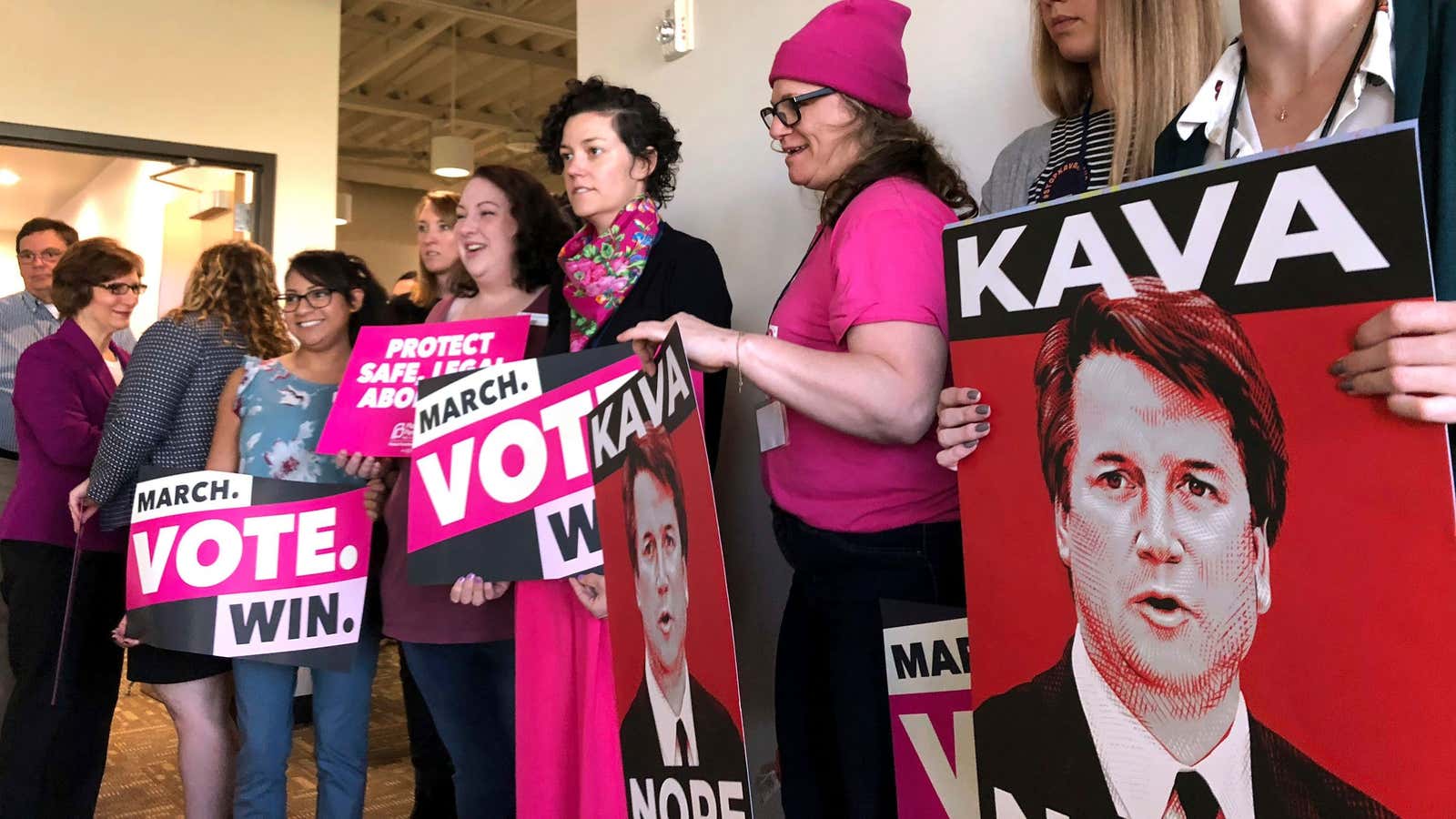With the confirmation of conservative Supreme Court justice Brett Kavanaugh, many abortion rights advocates fear that the right to abortion could soon be under threat. Nearly half of all Americans believe the new Supreme Court appointee would vote to overturn the precedent set by Roe v. Wade.
Anti-abortion lawmakers are already gearing up to pass “trigger laws” in conservative states. These laws are designed to be incompatible with Roe v Wade, and to prompt lawsuits that might eventually reach the Supreme Court. Rachel Sussman, national director of state policy and advocacy for Planned Parenthood told Quartz that at least 13 trigger laws have been challenged in local courts and could end up before the Supreme Court.
For example, one 2016 Indiana law, signed by then-governor Mike Pence, grants personhood to fetuses and requires abortion providers to dispose of fetal remains as human bodies. This law could pave the way to new restrictions on abortion providers and even criminalize abortion in Indiana; after a lower court struck it down, the state asked the Supreme Court to review it. The Supreme Court justices have not yet decided whether they will.
With a conservative majority now on the Supreme Court, the Nov. 6 midterms are key to both sides of America’s abortion debate. In Ohio, Michigan, and Wisconsin, gubernatorial candidates have made abortion a central issue. Meanwhile, voters in Oregon, Alabama, and West Virginia will vote directly on ballot measures about abortion.
Oregon: Measure #106
Oregon residents will vote on a proposal banning all public funds for abortion, except in cases where the mother’s life is in danger.
Oregon is a generally liberal state when it comes to abortion rights: It doesn’t impose its own limitations or waiting periods for abortion, and it doesn’t have laws ready to ban abortion should Roe v Wade be overturned so far.
The measure on the ballot is being presented as a fiscal, rather than moral, issue: Those who support the funding ban say it’s not intended to ban abortion, but to protect people’s taxes from funding other people’s reproductive choices. Those who oppose the motion argue that cutting state funding would reduce abortion access for poor women.
Alabama: Amendment #2
In Alabama, abortion is already subject to several limitations: Women seeking abortions must go through counseling and a waiting period. Abortion coverage is also limited for policies purchased through the Affordable Care Act’s marketplace.
The measure on Alabama’s ballot would amend the state’s constitution to recognize “fetal personhood,” equating the right of a fetus to those of a child. The fetus would be referred to as “unborn child.” A similar question has been posed but never passed in Colorado (2008 and 2010), Mississippi (2011), and North Dakota (2014).
If the measure passes in Alabama, it will likely be challenged in court as a violation of the state constitution.
West Virginia: Amendment #1
On the ballot in West Virginia is a measure that amends the state constitution to state that the right to abortion is not protected. It would block public funding for abortion, except in cases of rape, incest, and fetal anomalies, and would also ban Medicaid from covering the procedure.
None of the measures above present a direct challenge to Roe v. Wade, because they don’t obstruct abortion; rather, each proposal limits the individual state’s responsibility to provide or protect abortion rights. However, the measures do erode the idea that abortion is a right at all, says Steven Aden, the chief legal officer of anti-abortion organization Americans United For Life (AUL). Furthermore, if the Supreme Court ever overturned Roe v. Wade, measures like these could become foundations for each state’s local abortion law.
